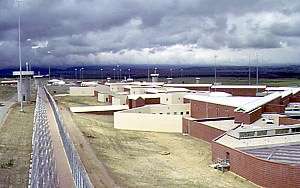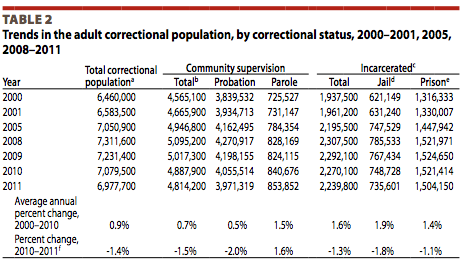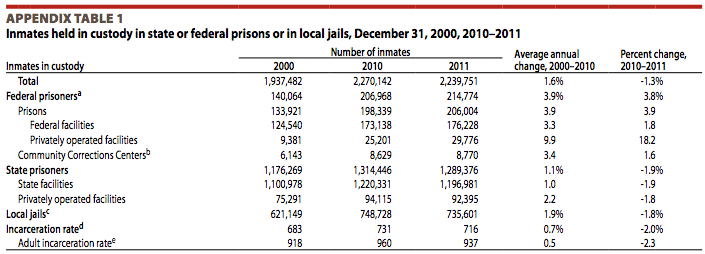America's Prison Population Is Finally Shrinking. Here's Why.
The number of adults under some form of correctional supervision in the U.S. has fallen from a historic high of 7.3 million in 2007, to 6.98 million in 2011.

The number of adults under some form of correctional supervision in the U.S. has fallen from a historic high of 7.3 million in 2007, to 6.98 million in 2011, according to a new report from the Bureau of Justice Statistics. Expressed as a ratio, 1 in 34 adults last year was a probate, a parolee, or a prisoner; down from 1 in 31 in 2007-2008. That's progress. Barely.
What explains the decline? The short answer is money. When the housing market crashed, cash-strapped states and cities were forced to take a hard look at their budgets. A lot of them realized they were spending insane amounts of money keeping nonviolent offenders in cages, so many increased funding for diversion programs like drug court and veterans court. Some states have also begun reducing penalties for parole and probation violations, which make up 75 percent of prison admissions in Texas, and cost Florida $100 million a year.
But these policy changes don't amount to opening the gates, as demonstrated by the chart below:

And none of those policies address head-on the single biggest growth driver for prison populations in the country: Draconian drug policies. In Wisconsin, for instance, the state's prison population has tripled since 1990, and 80 percent of that growth came from drug and alcohol convictions. Florida's prison population has quadrupled since 1984. According to Florida TaxWatch, the state spent $300 million in 2011 incarcerating drug offenders.
To the extent that you can quickly reduce a state's prison population, it's by lessening penalties for drug-related and victimless crimes. That's why the decline is happening at the state level, and not the federal level, where diversion is not an option, sentencing is less flexible, and early release is rare. In fact, the federal prison population is actually growing. In 2006, the federal corrections system oversaw 176,824 offenders. In 2011, it oversaw 214,000 offenders. You can see that growth in this chart:

According to a recent GAO report on the Bureau of Prisons, which we wrote up here, the agency expects the federal prison population to grow every year for at least the next decade. But it doesn't have to. Drug offenders make up more than half of the federal prison population, and the next highest offender population is people who have violated immigration laws. These people don't need to be behind bars, and it's strange to think that fewer of them would be if the federal government were unable to spend money it doesn't have.
Editor's Note: As of February 29, 2024, commenting privileges on reason.com posts are limited to Reason Plus subscribers. Past commenters are grandfathered in for a temporary period. Subscribe here to preserve your ability to comment. Your Reason Plus subscription also gives you an ad-free version of reason.com, along with full access to the digital edition and archives of Reason magazine. We request that comments be civil and on-topic. We do not moderate or assume any responsibility for comments, which are owned by the readers who post them. Comments do not represent the views of reason.com or Reason Foundation. We reserve the right to delete any comment and ban commenters for any reason at any time. Comments may only be edited within 5 minutes of posting. Report abuses.
Please to post comments


An older population as well. Crime is a young man's game.
I'm assuming that when Mr. Riggs talks about "nonviolent offenders", what he really means is "nonviolent drug offenders".
I do presume that most (or maybe all) of us do think that there is a place in the darkest hole of hell reserved for people who committed nonviolent, but still criminal acts.
Please elaborate on what non-violent crimes wold reserve someone a spot in the darkest hole of hell.
*would.
Fraud?
Theft.
Talking during a movie, bragging about a new baby, driving 10 mph below the speed limit.
Death penalty for those moral offenses.
The speed limit one would certainly free up the roads around here.
Bernie Madoff, you're free to go! After all, you hurt no one!
Did I say I disagreed? No, I was just curious what offenses you were thinking of.
I kinda thought that. But I just thought I'd throw a few examples out, you know, for the team.
Did you feel safer knowing Martha Stewart served time?
Eliot Spitzer, you're free to go! After all, you hurt no one!
Oh wait, bad example. He got his own tv show and lectures for big money on ethics. I guess we did save money on him.
Justice Bobbe Bridge, you're free to go! AFter all, you hurt no one!
Oh wait, bad example, she remained a sitting judge in good standing.
Ok, I take it back. Let everyone out who's nonviolent.
scam artists who scam old people out of thousands of dollars.
people who steal my debit card number and go on a shopping spree in Spain!!! (FUCKERS!)
I'm still waiting for Episiarch to post: Michael Bay, you're free to go! After all, you hurt no one!
Pedro Espada, you're free to go. After all, you hurt no one!
Jesus christ, did you even read my comment?
Don't step in the way of a newly-born meme, bro.
I have now, but I don't refresh after every example. Slows the process down.
It might be interesting to see how various libertarian types feel about that. Years ago, when Steve Kubby was running for Governor of California, he put out a press release saying non- violent prisoners shouldn't be incarcerated.
I replied on the state LP e-mail list, asking him this exact same question: How do you define non- violent offenses? As I recall he just replied if the offense didn't involve violence, the person shouldn't be incarcerated. Not really an answer.
I reminded him that some crimes, like theft, are what most consider non- violent but can be serious criminal acts, especially to the victim. What was he saying we should do with common thieves?
I don't recall his answer, but a number of others on that e-mail list simply repeated his statement: non- violent criminals shouldn't be in jail. We can put them on probation instead, or some such.
So what do we do if they keep stealing, I asked, put them on probation for a few more months? At least a few on that list thought that was a viable alternative to incarceration. I didn't.
"veterans court"
Utter crap - so much for equal justice under the law. Who effing cares if you once were in the uniformed employ of the DoD? Get in line with everyone else. Bah.
Fake veterans courts would be good. Seems like every other bum around here fits himself out with some surplus camo and pretends to be a "messed up Nam vet" .
Florida's prison population has quadrupled since 1984
I don't know what the stats were in '84, but in 2006 I worked on the FLDOC electronic admissions project (all intake records done in electronic format only). Doing random audits, I'd take 50 or 100 intake records at a time and make sure all of the information was on there and correct. About 1/3 were felony DUI, 1/4 felony possession, and about another 1/8 were possession plus an aggravating crime in the arrest (resisting, fleeing, etc.) The rest were actual crimes of violence, theft or fraud. So yeah, count me surprised that Florida's prison population grew at more than double the general population growth.
*Felony DUI = 3 or more DUI, without any additional criminal charges.
Really? Here a felony DUI occurs when you cause serious bodily injury or death. Here is South Carolina.
Yes. That's why I was clarifying. These were just the people who had received 3 or more DUI convictions since whenever the law changed. Early '90s I believe. There are aggravating clauses for even the first offense, but the statute was on the form, and I was only counting the 3+ DUI ones.
Sometimes dude you jsut have to roll with it. Wow.
http://www.IP-Hidden.tk
super blogs thanks admins
sohbet
sohbet odalar?